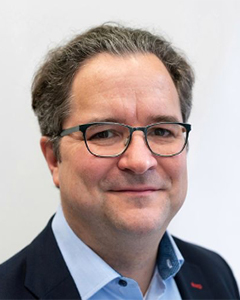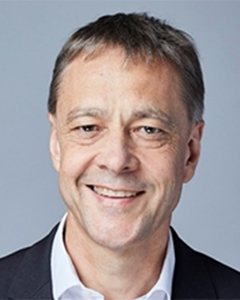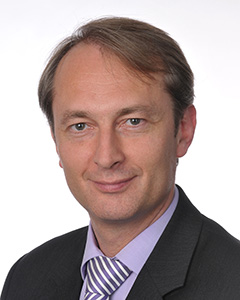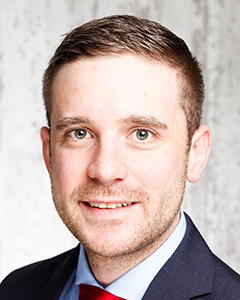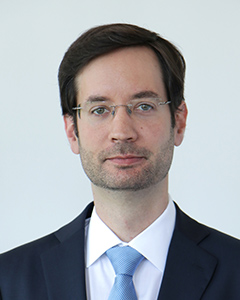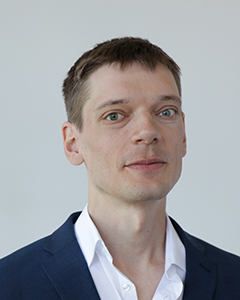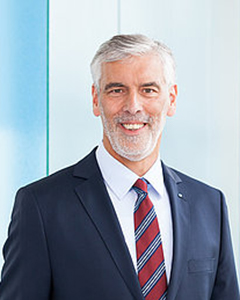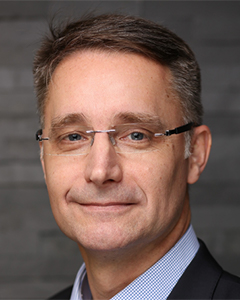Industrial Keynotes
Tuesday, July 14, 16:00-17:30
The Industrial Keynotes session will be held on Tuesday, July 14, 16.00-17.30 (Berlin time, CEST/UTC+2h) and will feature the the following speakers.
The session will be chaired and opened with an introduction by Ulrich Jumar at 16.00. Ralph Appel, Director of the Association of German Engineers VDI will present a short greeting talk at 17.05. There will be time for a brief discussion from 17.25-17.30.
Georg von Wichert
Siemens Corporate Technology
Top-down and bottom-up: Formal representations of things and procedures in autonomous systems
Tuesday, July 14, 16.05-16.20
Bernhard Eschermann
ABB
From automated towards autonomous production – a journey
Tuesday, July 14, 16.20-16.35
Dieter Förtsch, Marc Kalliski
Bayer AG
On the Road to Carbon Neutrality – A Holistic Perspective and an Exemplary Energy Efficiency Project
Tuesday, July 14, 16.35-16.50
Matthias Kiesner, Robert Steingräber
CODIALIST/Berlin Heart
Move, grow and play: impact of closed-loop control on families waiting for donor hearts
Tuesday, July 14, 16.50-17.05
Ralph C. Appel
Executive Director and Member of the Board, VDI
Message of greeting of VDI – The Association of German Engineers, host of 21st IFAC World Congress
Tuesday, July 14, 17.05-17.10
Kurt D. Bettenhausen
AUTOMATION 2030, VDI Digital Transformation
AUTOMATION 2030: Shaping our Future – Scenarios and Recommendations
Tuesday, July 14, 17.10-17.25
Georg von Wichert (Siemens Corporate Technology)
Top-down and bottom-up: Formal representations of things and
procedures in autonomous systems
Tuesday, July 14, 16.05-16.20
Abstract: The talk will argue that autonomy is a system property that arises in the intersection of automation, digitalization and artificial intelligence. Autonomous systems will boost automation to a completely new level and have numerous applications across virtually all industries. However, many of the current attempts to create autonomy do not systematically address the two main challenges, complexity and uncertainty. While machine learning can and will play an important role, real machines executing real tasks will not master the real-world complexity without significant prior knowledge for structuring their almost infinitely complex work and action spaces. The talk will summarize some latest work at Siemens Corporate Technology and discuss the need for and potential of formal representations in autonomous systems.
Bio: Georg von Wichert currently heads the research group Robotics, Autonomous Systems & Control at Siemens Corporate Technology. The team focuses on advanced algorithms for cognitive systems including artificial intelligence to control technical systems and processes. Applications areas are advanced automation, autonomous systems, robots, and vehicles, sensor data and information fusion, and human-machine interaction. Georg holds a PhD in Robotics and Control Engineering from Technische Universität Darmstadt, Germany. He joined Siemens in 1998. Georg von Wichert is a Rudolf Diesel Fellow of the Institute for Advanced Study at Technische Universität München, where he also gives lectures on Advanced Robot Perception. He also is a member of the Research Council (Forschungsbeirat) of the national German platform Industrie4.0 and regularly contributes as a reviewer to the H2020 program of the European Commission.
Bernhard Eschermann (ABB)
From automated towards autonomous production – a
journey
Tuesday, July 14, 16.20-16.35
Abstract: In this keynote, we will introduce the
challenges and first successes on the path from automated towards
autonomous operations.
To date, automation mainly focuses on the
“sense - control – act” cycle, which has evolved from repetitive
steady-state control to covering regular activities in normal
operations, such as start/stop. This inner control loop is extended to
longer-cycle time loops for production optimization that often involve
humans.
With data analytics solutions entering the field, insights
on assets (for example pumps, motors, etc.) can be considered in
operations decisions; on the other hand, operations can be tuned to
allow delaying maintenance or replacement of assets. Operations and
asset analytics can be further improved by linking “OT” data to the
world of “IT” data, derived for example from maintenance management
systems. This functionality might be implemented “in the field”, “on
premise” or “in the cloud”, and hence no longer organized in the
traditional automation pyramid.
We project that this allows to
move to a “perceive – understand – solve” cycle, that self-adapts
throughout a plant’s lifecycle. While handling of real-time, safety and
availability requirements will continue to be done close to the asset,
AI methods, such as machine learning, can then also be implemented
further away from the asset itself.
Reaching autonomy will require
two major changes to today’s system architecture: i) The cascaded
“perceive – understand – solve” cycle needs to be present over the full
course of the lifecycle of the plant, instead of only overseeing
operations and ii) system borders need to be fluid and allow for
continuous change. Consequently, “ET” (engineering technology) needs to
be included into the cycle, through “digital twins”, and used from the
planning phase through operations to closure.
Examples from
shipping and mining will showcase where we are on this journey.
Bio: Bernhard Eschermann is Chief Technology Officer of ABB’s Industrial Automation business and member of ABB’s Group Technology Leadership Team since 2013. He joined ABB in 1993 and has held a variety of management positions within the company since then. Prior to his current role, he served as General Manager of ABB’s Power Semiconductors business from 2006 through 2012. From 2001 to 2006 he was Managing Director for ABB’s Corporate Research Center in Switzerland. Other earlier roles included responsibility for R&D organizations in Substation Automation and Power Electronic systems. Outside of ABB, he is a board member of OPC Foundation and serves on the Innovation Council of Innosuisse, the Swiss federal agency for the promotion of innovation projects. He is also a member of Swiss Academy of Technical Sciences (SATW) and a member of the board of Hasler Foundation. He holds a PhD in Computer Science from the University of Karlsruhe, Germany, and an M.S. in Electrical Engineering and Computer Sciences from the University of California, Berkeley.
Dieter Förtsch, Marc Kalliski (Bayer AG)
On the Road to Carbon Neutrality – A Holistic Perspective
and an Exemplary Energy Efficiency Project
Tuesday, July 14,
16.35-16.50
Abstract: The climate change caused by emission of
greenhouse gases (GHG) is a major challenge we are facing today. Against
this background, Bayer has committed to the ambitious target of reducing
its emissions of GHG and making its own operations carbon neutral by
2030. Since the emissions of GHG stem from various sources – including
chemistry-, energy- and transport-related activities – a holistic
perspective is required to develop reasonable action plans. The “Climate
Check (C²)” approach outlined in this Industrial Keynote provides a
classification and transparent mapping of GHG sources and measures, and
it is thus an essential first step for understanding current GHG
emissions and for a realistic evaluation of reduction potentials.
Besides chemistry- and transport-related sources, the consumption of
energy by in-house production processes contribute significantly to GHG
emissions. Since they can be directly influenced by changing process
operations, Bayer has set internal targets to reduce GHG-Emissions by
improving the energy efficiency of production plants. This requires the
ability to measure the energy efficiency in a consistent manner and to
identify improvement measures.
An exemplary current project is
presented in which an ISO50001-compliant monitoring system is developed,
which can capture the performance on plant level with a consistent
calculation and aggregation method to also report the site level for
retrospective reporting. The analysis accounts, among other factors, for
weather and load influences. The project further aims at optimizing the
energy efficiency by monitoring the most energy intensive unit
operations against their best demonstrated practice using Energy
Performance Indicators which capture the efficiency variations on a high
granularity. By performing multivariate data analyses, it is often
possible to identify the operational causes which lead to inefficient
production states.
However, carbon neutrality cannot be achieved
solely by improving the energy efficiency but also requires other
measures, e.g. utilization of renewable material and energy sources as
well as compensation measures for inevitable GHG emissions. This fact is
a key element of the holistic approach applied by Bayer.
Bio: Dr. Dieter Förtsch is Principal Expert for Energy Efficiency and Combustion Technology at Bayer AG, Engineering & Technology. After studying process and chemical engineering in Nürnberg and Stuttgart, he received his Ph.D. degree with studies of combustion chemistry and fluid dynamics from the University of Stuttgart. He was visiting researcher at the Ohio State University and the Institute for Problems in Mechanics of the Russian Academy of Science and joint Bayer in 2001. Dr. Förtsch has been engaged in various sustainability studies and projects (involving environmental and energy topics) and is currently leading the “Climate Check (C²)” project at Bayer. He is lecturer of “Environmental Technologies in the Chemical Industry” at the Ruhr University of Bochum, appointed member of the ProcessNet Expert Group “Gas Cleaning”, and member of a DIN Working Group.
For additional information about Mark Kalliski, please visit https://www.linkedin.com/in/marckalliski/.
Matthias Kiesner, Robert Steingräber (CODIALIST/Berlin Heart)
Move, grow and play: impact of closed-loop control on
families waiting for donor hearts
Tuesday, July 14, 16.50-17.05
Abstract: Heart failure affects 26 million people
worldwide. Through heart failure the heart loses the ability to pump a
sufficient amount of blood to satisfy the body’s oxygen demand. For
affected children the transplantation of a donor heart is often the only
solution. A lack of donor hearts leads to long waiting times of months
or even years in many countries. When the heart becomes too weak,
ventricular assist devices (VADs) are used to generate the necessary
blood flow until a donor heart is available.
Berlin Heart
develops, produces and distributes VADs. The product EXCOR® is a
paracorporeal VAD. The main compo-nents are a blood pump with a membrane
separating blood and air chamber and a driving unit that produces air
pressure for the membrane deflection.
Until recently, the
stationary machine EXCOR® Ikus was the only driving unit for pediatric
patients. The lack of mobility is a major limitation for the affected
growing children and their families. Therefore, Berlin Heart developed
the mobile, much smaller driving unit EXCOR® Active. The principle of
pressure generation had to be changed from a compressor to a mova-ble
piston in a pneumatic cylinder. This fundamental change required a
completely new control concept.
For the development a detailed
Simulink model and a mock loop were built. The resulting controller
moves the piston on an optimized trajectory to operate the pump’s
membrane reproducibly and fast while keeping wear and current
consumption low. Friction estimation and a nonlinear current control
model are part of this loop. Different pressure targets for the open-ing
of an air mass regulating valve ensure easy adjustability by the user
and a good rejection of disturbances. Changes in atmospheric pressure
and the pump pressure amplitude are compensated directly. An adapting
valve model keeps power con-sumption low and prevents slow control
behavior.
EXCOR® Active is currently CE certified only and
supports first pediatric patients. Feedback from parents and doctors is
very positive. They describe the possibility of taking a walk in the
outside area of the clinic, the reduced noise level and the generally
better conditions for the development of the child due to the increased
mobility.
Bio: Dr.-Ing. Matthias Kiesner and Dr.-Ing. Robert Steingräber are experts for control algorithms for ventricular assist devices at Berlin Heart GmbH. They will continue their work on control algorithms for medical device software at the company Codialist GmbH, which is currently spun off from Berlin Heart. Dr. Kiesner studied mechanical engineering at the Technische Universität Berlin; he then wrote his doctoral thesis “Closed-loop active flow control of a stator cascade with sidewall blowing and trailing-edge blowing” at the chair of measurement and control. Dr. Steingräber studied Computational Engineering Science at the Technische Universität Berlin. He wrote his doctoral thesis "Haptic Interaction and Training Algorithms in Stroke Rehabilitation" at the DFG graduate school prometei, an interdisciplinary research training group that focused on human-technology-interaction.
For additional information about Matthias Kiesner, please visit https://linkedin.com/in/matthias-kiesner-31859b1b0/.
Ralph C. Appel (Executive Director and Member of the Board, VDI)
Message of greeting of VDI – The Association of German
Engineers, host of 21st IFAC World Congress
Tuesday, July 14,
17.05-17.10
Bio: Ralph Appel, born 1958 in Hamburg, is married and father of two children. He studied industrial engineering at the University of Hamburg and the Technical University of Hamburg-Harburg, where he graduated as a certified industrial engineer with specialized knowledge in automation, product engineering, materials management, industrial management and economics.
Kurt D. Bettenhausen (Chairman Working Group AUTOMATION 2030, Chairman VDI Digital Transformation)
AUTOMATION 2030: Shaping our Future – Scenarios and
Recommendations
Tuesday, July 14, 17.10-17.25
Abstract: For more than 20 years, VDI/VDE-GMA has
developed theses and recommendations, how future developments in
automation will impact our future life and vice versa. The first glimpse
into the future was taken in 2003 and pictured the year 2010. The
central statement was: Automation technology serves humankind!
A
deeper look at the theses and future forecasts formulated at that time
clearly shows that the scientists and company representatives developed
reliable predictions. Today, automation enables improvements in product
quality, increases in productivity, higher reliability and higher
safety. As a consequence, automation supports the protection of the
environment by minimizing the use of natural resources, as well as the
humanization of work and an improved quality of life. New products and
systems are enabled and automation advances into new application
areas.
The theses of that time, that sensors and actuators will
become integral components of automation systems and that automation
technology will merge with other disciplines, have also proven to be
true. The user-oriented design of future systems was said to be at the
forefront. A well-founded education and continuous further training
should remain a "must" for engineers in automation technology.
Also, the final thesis “Automation changes jobs” still applies – maybe
today more than ever before.
The newest release AUTOMATION 2030
has been developed by a joint project team of scientific und industry
experts between January 2019 and Mai 2020. Based on the most important
technology enablers, the full document addresses the societal aspects
and the required new business models in addition. The resulting
scenarios and recommendations will be discussed.
Bio: Please see https://www.linkedin.com/in/kurtdbettenhausen/.
